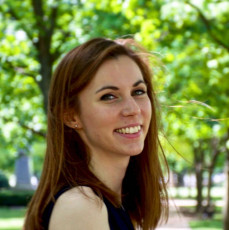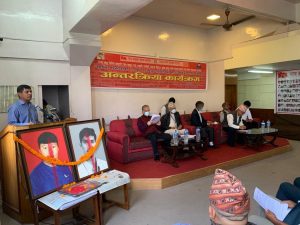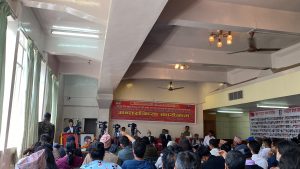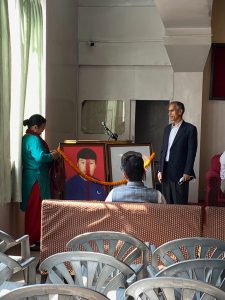A dear friend of mine recently lost her father quite suddenly right before I came to Nepal. I’ve been thinking about that friend recently and about what it means to be there for someone else and witness just a fraction of their grieving process. Through this most recent example and really in all forms of grief, I’m noticing myself coming back to the idea of narrative. The story of a loved one’s final moments and the story of our own final moments with that loved one if the experiences were separate are narratives we retell surprisingly often.
Not only that, we notice that other people, rightfully or not, will even inquire with the lost person’s loved one about that story. This back and forth retelling starts to nestle itself within the overall memory that we hold on to about our loved one until it too becomes another chapter in the story of their life. I think there’s a search for meaning in that story and hopefully, eventually, catharsis in its telling.
But what happens when that narrative, that story, doesn’t end? When it perhaps can’t end because there is no ending?
Ram, the director of the Network of Families of the Disappeared (NEFAD), kindly invited me to an annual commemoration event held in Kathmandu for two out of seven people who were disappeared on the same day from Kathmandu. The families of the two students being honored at this event established this tradition of memorialization and gathering.
Representatives from all different facets of society were invited to pay their respects and speak on the status of the transitional justice process in Nepal. Each invitee came forward to the portraits of the two disappeared students and paid their respects. Afterwards, the whole room joined in a moment of silence in their memory.
I was struck by the collective meaning-making happening in front of me. There is the first injustice of the crime committed against the disappeared themselves, and the secondary injustice to their family and friends who are denied the truth about what happened to their lost loved one. In the absence of an alternative, families and advocates were coming together to somehow write an ending to a story that has no end.
In honoring the memory of individuals, a new story is being written – the story of the transitional justice process as a whole. Willingly or unwillingly, everyone in that room is a part of the struggle for justice that after 16 years since the Comprehensive Peace Accord (CPA) was signed in 2006 still has no ending.
Speakers took to the podium one by one and we heard from family members, civil society activists, the new law minister, and representatives from the various political parties, the former constituent assembly that wrote the constitution, the government’s commission on enforced disappearances, and the human rights commission.
The attitudes, emotions, blame, and suggested courses of action expressed stretched across a full spectrum. Some speakers used the opportunity to further a political agenda, while others prioritized explanations for the delays. Lots of challenges are present, but it seemed to me that a growing villain, so to speak, in this story of transitional justice is the passage of time.
Time normally would be a byproduct of the other underlying challenges, and not be its own separate entity. But with all the time that has passed since the peace agreement was signed, trust erodes, priorities change, frustrations grow, and hope for answers and solutions wanes. Through this turmoil, I respect voices like Ram’s which remind us to find a true north in the needs and priorities of those most closely affected by disappearances.
Posted By Therese McCarry
Posted Jun 18th, 2022






1 Comment
Iain Guest
June 30, 2022
Hi Therese. You write that the passage of time is the “villain” in this story, but how come so many relatives like Ram seem to feel increasingly frustrated as time goes by? The trauma, if anything, seems to increase with time as they get stonewalled. I think this probably applies to anyone who has lost someone to a crime, but it is particularly noticeable with the disappearances. It will be interesting to see what you think after spending time with family members in Bardiya…..